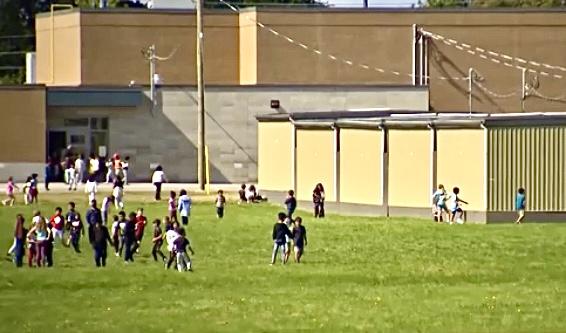今日11点15分,加拿大总理特鲁多将会进行全国讲话。
实时快讯:
- 特鲁多宣布,政府和亚马逊加拿大公司签署协议,共同管理疫情期间的物资配送问题,把物资送到各省各地区。
- 特鲁多宣布,政府将会动用数百万资金,帮助类似Food Bank等机构获得更多物资,帮助需要的市民。同时也鼓励想要帮助的志愿者联系自己地区的food bank。
- 政府会增加GST Credit 帮助低收入人群,家长可以收到更多的孩子牛奶金,而且将会改为从4月开始实施。
- 特鲁多说,我知道很多人都想知道,这个疫情到底要持续多久,昨晚我和各个省的省长开了会,我们商讨了数据分享和预测的方法。好消息是,很多市民都接受了测试,所以专家可以有足够的数据去分析预测,这个分析数据很快就可以公布了。
我也很想告诉大家这个疫情什么时候会结束,但是这取决于每一个市民的行动。只有大家都遵守了卫生部的建议,我们才能更早的结束这个疫情。保持安全的社交距离,待在家里,我想你保证,做到这些,我们就一定可以战胜病毒!
提问环节:
- 记者问:我们今天知道美国要求3M公司停止出口口罩给加拿大,政府知道任何相关情报吗?你有收到通知吗?加拿大要怎么应对?
特鲁多回答:疫情期间,加拿大和美国一直保持着紧密的联系,所以他们也清楚,加拿大政府了解彼此在做什么,尤其是美加之间的抗疫物资贸易信息。在Windsors有上千名护士在底特律工作,美国也依赖这些加拿大的护士。如果由一方限制了物资之间的流通,我相信可能是一个误解。我们也向美方明确的表达了我们的意见,并且确保加拿大人可以获得我们应得的物资。
他补充道:我对美加之间的关系表示有信心,我们会彼此依赖,相信双方政府不会再插手两国的自由贸易的。 - 记者问:我们听闻有加拿大的口罩被转移到美国了,想问加拿大政府会有决策,禁止口罩被寄往美国吗?
特鲁多回答:我可以告诉你的是,美国和加拿大之间的贸易不会关闭,会继续进行。疫情期间,我知道大家有担忧,政府也在跟进这些事情,会确保加拿大获得我们需要的物资。 - 记者问:有部分医疗机构已经出现了物资紧缺的问题,政府要怎么确保购买的物资可以及时送到呢?
特鲁多回答:我们有一个特别完善的医疗体系,更多的企业也在为加拿大生产物资,政府会确保所有的医疗机构都可以获得物资,我们会继续跟踪每一个医疗机构的供应状况,确保没有医院,没有市民会面临物资短缺的问题。
以下是特鲁多4月3日的演讲英文全文内容:
Before we get into things, I have two pieces of news to share with everyone. The first one is about the distribution of critical equipment to provinces and territories. For the past few weeks, our government has been working closely with industry to produce the supplies our health-care workers need, like masks, face shields, gowns, ventilators and test kits.
Today, I can announce that our government has signed an agreement with Amazon Canada to manage the distribution of this equipment to the provinces and territories.
[Speaking in French] Amazon will use its wide distribution network for the purpose of guaranteeing the delivery where medical equipment is most necessary.
The second news is regarding the Canadian Armed Forces. We received a request from Quebec for the Canadian Armed Forces to intervene for the purpose of helping isolated and remote communities. As I said, the members of the CAF are always ready to do so in order to fight COVID-19.
For a few weeks now, lives have been completely changed. We stay home, we do not send children to school. But some families are having an even more difficult time. If you lost your job, if you’re no longer receiving a paycheque, you’re wondering not only how you can pay your bills at the end of the month, but how you can buy groceries the next day. [end French]
Across the country, there are food banks that can help. But like most organizations, food banks are facing new challenges because of this pandemic. With everyone staying home, they have fewer volunteers and a difficult economic climate means they’re receiving fewer donations than they normally would–while demand rises. The staff at the Neighbour to Neighbour food bank in Hamilton told us they’re getting more and more calls, and it’s overwhelming for the volunteers who are spread really thin and working overtime to help their community.
The work being done by food banks and their volunteers is essential, so there’s no question that they need more support during this crisis. If you have the time and ability to help, reach out to your local food bank and ask them how you can help them. At the same time, I’m announcing that the government will provide $100 million to meet the urgent food needs of vulnerable Canadians, including those living in Indigenous and northern communities.
This money will help ensure that organizations can buy and deliver food to those who need it the most. It will help support organizations that you may already know. Like Food Banks Canada, Breakfast Club, and The Salvation Army, and many more. And on that note, I do want to take a moment to thank all volunteers and organizers. Thank you for feeding our communities, we see you, and we are grateful for the incredible, tireless work you do, even in these extremely difficult circumstances— especially in these extremely difficult circumstances. You are doing essential work for our most vulnerable. You’re showing what it is to be Canadian: to be there for each other in times of difficulty.
[Speaking in French] Today, I am announcing that the government will invest $100 million to meet the urgent food needs of the most vulnerable, including people living in northern and Indigenous communities. This money will help food banks to buy and deliver provisions to those who need them. Since the beginning of the pandemic, food banks have been facing specific challenges. For example, most of their volunteers are people who are retirees and who are more at risk of being infected. That means fewer people to serve a larger clientele. Food banks and charities are doing an incredible job in our communities and they do so all year long. I’m thinking of the town of Villeray, that I’m familiar with, where people are working very very hard to help their neighbours in my riding of Papineau. If you have the time and ability to help these days, I invite you to get in touch directly with these organizations in your neighbourhood. They need your help.
I know there are many of you who are going through difficult times. The pandemic is creating a lot of uncertainty and you’re worried. But I want you to know what our government will not abandon you. We are investing in food banks so that you can meet the urgent needs of your family during this crisis. And at the same time, we are offering financial assistance to people or their paycheques because of COVID-19.
We are introducing the Canada Emergency Response Benefit that will give you $2,000 a month. Our government will also increase the GST credit to help people whose income is low or modest. We said that adults who are eligible will receive up to $300 or $150 per child starting in May. But I can now confirm that they will receive that help this month, in April. [end French]
Our government is also supplementing the GST credit to help low-income people. We had said that in May, every qualifying adult would receive up to $300, with $150 for each child, but I can now confirm that help is coming sooner — this month, in April, instead. Our government has also been working with major banks to deliver benefits, including the CERB, through direct deposit. Effective today, people should visit their banks’ website for information on how to enrol for direct deposit, if they haven’t already.
[Speaking in French] I know that many of you would like to know how much time this will last. You are wondering when you’re going to be able to see your friends, hug your grandparents or have people over for dinner. Last night, I had a discussion with the premiers of the provinces and territories. We talked about data sharing and projections. The good news is that many more people are being tested, and experts have more data to analyze. The provinces and territories are now updating their information and will be publishing the latest data very soon. On our side, we’re working very hard to verify the latest figures so that we can put them online. You can consult canada.ca/coronavirus to get the best updated information about the spread of the virus.
I’d like to be able to tell you exactly when all of this will be over. I often talk about weeks, and even months, but the reality is that it will depend on each of us. The best way to minimize the impact of COVID-19 is to continue to follow public health directives. You know them: stay home as much as possible, limit your movements, and if you absolutely must leave home, keep a distance of two metres from other people. Continue to do your part and I promise you we’ll come through this. [end French]
I’d like to close today with a message for young people and children. On Sunday, I’ll be holding a video conference, focused on you, with Dr. Tam. So send me your questions through CBC Kids’ websites by the end of the day, and I’m looking forward to answering you this weekend.
(CFC记者编辑)
 新华侨网
新华侨网






